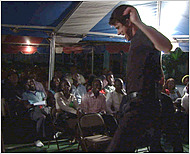 The San Francisco-based theatre artist Dan Hoyle’s solo show about Nigerian oil politics, Tings Dey Happen, explores, among other provocative issues, the impact of visiting westerners on the lives of Nigerian locals. In response to what I wrote about the production in my weekly New York Times culture column on November 15, Hoyle evaluates his work and experiences as a white American conducting research for a theatre project in the Niger Delta.
The San Francisco-based theatre artist Dan Hoyle’s solo show about Nigerian oil politics, Tings Dey Happen, explores, among other provocative issues, the impact of visiting westerners on the lives of Nigerian locals. In response to what I wrote about the production in my weekly New York Times culture column on November 15, Hoyle evaluates his work and experiences as a white American conducting research for a theatre project in the Niger Delta.
Tings Dey Happen deals explicitly with the impact that white people–even well-meaning white people–can have as foreigners in Nigeria. The decision to, As Ms. Veltman puts it, “take myself out of the play” was, I think, important to keeping the focus on the people I talked to, to ensuring that this was not just another play about a white guy in Africa. But totally removing my “shadowy presence” – again, Ms. Veltman’s words — would have been disingenuous. I was there, I was asking the questions. I don’t portray myself as a character, but I use my search for answers as a narrative device–at its core, the play is, to use a cliché, a journey of discovery. It’s about getting past the usual pity and guilt and trying, really trying, to understand Nigeria’s people, its culture, and its politics. When the characters address my “shadowy presence,” they are also addressing the audience–challenging them, as I was challenged.
But these criticisms are all valid enough, and I wouldn’t be writing this response but for the suggestion that I’ve led my friend Williams (represented in the play as Okosi, a Delta militant) to give up his comfortable life as a killer, and that as a result he now lives a life of poverty. For it’s not the whole story. Williams’ life as a militant was not prosperous or even financially stable. He would have irregular paydays after participating in violent missions that would sustain him for several weeks, but he was still living in a wooden shack with no electricity or readily available fresh water, like everyone in his village. Williams’ current life is hard, with less money, and he, like most Nigerians, struggles to get by every day. But when I talked to him on this most recent trip, Williams told me that he is happier now than when he was in the gang. He is happier for several reasons, but principally because he doesn’t have to deal with the traumatic horror, guilt, and shame of participating in violence and killing. When I stayed in his shack in Nembe Creek, he would have violent nightmares that made him thrash around on the bed we shared at night. He still suffers from nightmares, he told me, but leaving militancy, and sharing his stories, “helps free my mind. And the only real freedom is in your mind.”
Furthermore, I have worked to help Williams. When I left Nigeria in 2006, I introduced him to the new Fulbright Scholar in the Niger Delta, who introduced him to a prominent University of Port Harcourt professor who was able to get him a job offer. This didn’t work out, but as people who have done this type of work before know, transitioning from a traumatic, unstructured life to the daily routine of regular work is not easy.
In Abuja last month, I helped arrange for Williams to meet with a Nigerian Senator. The Senator, Williams now tells me, has offered to pay for his University education. This is a great development, and I wait with fingers crossed, hoping that it works out. Just today Williams called me to say the Senator has given him the seed money to start this process. Additionally, while in Abuja last month, I suggested to U.S. Embassy folks that they arrange a speaking tour through the Delta in which Williams could tell his story and advocate for non-violence. They have connected him with various NGOs that could organize this kind of program. Other NGOs are eager to speak with Williams, having been impressed with the interview we did together for Africa Independent Television.
Going back to Nigeria to perform my play for Nigerians, and holding discussions with Nigerians, and giving interviews to Nigeria’s media, and leading theater workshops for Nigerians–all this expanded and deepened my engagement with Nigerian society. Having come back to the US, to perform again for Americans, I have sought to share my fresh insights in the post-show discussions. But the message of the play remains the same: to understand Nigeria we must try, harder, to get past pithy analysis and see things as Nigerians see them. Only then will we be able to confront the true consequences of our presence in (or absence from) Nigeria.
Hoyle’s show plays through November 29 at the Marines Memorial Theatre in San Francisco. Click here for tickets.
Also, you can read my original review of Hoyle’s production for SF Weekly (published in January 2007) here.
